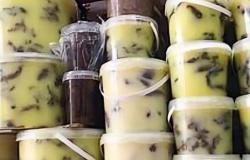With the visit to welcome, the roasts to take out of the oven, the drinks to serve… we can forget to put the hors d’oeuvres that have been on the counter for too long back in the refrigerator. To avoid food poisoning, foods stored in the refrigerator should remain at room temperature for a maximum of two hours.
In the context of the holiday season, the Association of Microbiologists of Quebec (AMQ) has launched a call for vigilance to remind people of the measures to follow for proper food preservation.
“In Canada, there are more than five million Canadians who, every year, will become ill due to contaminated food; food poisoning. And of this figure, almost 12,000 people will be hospitalized, which will lead to an average of up to 250 people per year dying from food poisoning. […] and during the holiday season, there are still a good number of these poisonings that occur,” warns Marc Hamilton, president of the AMQ.
Depending on the person’s state of health, food poisoning can lead to hospitalization. “Food poisoning, very often, will be mild, even just cramps or abdominal pain, diarrhea, nausea, vomiting, headaches. Sometimes, we will have a fever which very often, if this fever does not subside, will take us to the emergency room to check if it is indeed food poisoning and identify the bacteria which is infecting us,” explained in interview Mr. Hamilton.
He specifies that, most of the time, the bacteria involved will be salmonella, Listeria or even E. coli “which could lead to more serious consequences”. This includes septic shock, kidney dysfunction and, in rare cases, death. Mr. Hamilton recalled that onions contaminated with E. coli in McDonald’s products in the United States recently caused one death.
Food shelf life
The AMQ recommends that dishes that are normally stored in the refrigerator, such as sandwiches, deviled eggs, salads, shrimp crowns and anything that contains mayonnaise, should not spend more than two hours on the counter .
Food should be stored between 0 and 4 degrees Celsius to prevent it from becoming an environment conducive to the growth of bacteria. As the outside temperature in winter often hovers around zero degrees Celsius or well below, food can be temporarily stored outside. However, you should avoid placing them in direct sunlight, which would heat up the food and create an environment conducive to the growth of bacteria.
“Scientifically speaking, we know that after two hours at room temperature, these foods, the bacteria they contain, which may or may not be harmful, will begin to multiply inside the food and, when is reached at three or four hours, these bacteria can reach a threshold which could cause food poisoning,” explains Mr. Hamilton.
For already cooked foods, it is possible to leave them on the table a little longer since cooking will have destroyed a large part of the pathogenic bacteria, but it is prudent not to exceed four hours at room temperature.
In the days that follow, dishes with cooking such as turkey and pie will keep for a maximum of four days in the refrigerator if they have not been frozen. After this period, the association argues that the bacteria will have multiplied to an “abnormally high” level.
Mr. Hamilton also warns that the same kitchen tools should not be used for meats as for vegetables which will be eaten raw to avoid cross-contamination.
A professional order to counter disinformation
The AMQ has been calling for more than two years for microbiologists to be supervised by a professional order in Quebec. The association argues that their expertise is essential in several areas to guarantee public safety. For example, microbiologists analyze drinking water in Quebec and ensure the safety of food. They also participated in the manufacture of vaccines during the COVID-19 health crisis.
The president of the AMQ stressed that during the pandemic, there were “a lot of conspiracy theorists” who claimed to be microbiologists and who spread false scientific information. “We had several complaints from people who contacted us to tell us to do something,” says Mr. Hamilton.
He explained that his association could not sanction those at fault. “Even if we have an internal code of ethics, we cannot apply it because we are not a professional order and we do not have an investigative trustee either,” explains Mr. Hamilton.
He said he met with opposition political parties, officials from the Office des professions du Québec and the office of the President of the Treasury Board, Sonia LeBel.
The association would like to have a bill similar to that on the modernization of professional laws which would allow it to have a consolidation of scientists within the same professional order. The AMQ would like to be part of the Order of Chemists, which would be simpler to set up than creating a new professional order.
According to Mr. Hamilton, Minister LeBel was open to the proposed merger, but her team responded that there were more priority issues to resolve.
The QMA, which represents more than 500 certified microbiologists, cited a CROP survey conducted in 2023 to show public support. The results specified that eight out of ten Quebecers support this idea.
—
The Canadian Press’ health content receives funding through a partnership with the Canadian Medical Association. The Canadian Press is solely responsible for editorial choices.







